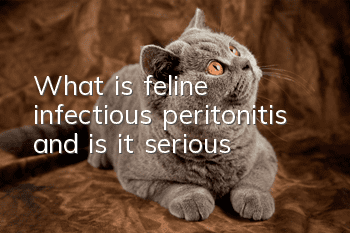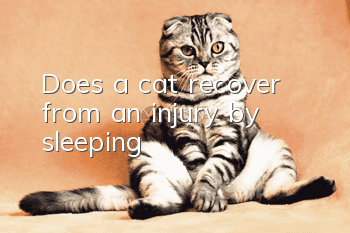What is feline infectious peritonitis and is it serious?

I don’t know when it started, but the “Chinese cat” group started to make people talk about it.
Chinese name: Feline infectious peritonitis;
English name: Feline Infectious Peritonitis;
Abbreviation: FIP.
"Product" description: This is a viral disease transmitted by coronavirus, and both stray cats and domestic cats will be "affected";
Route of infection: saliva and feces, such as shared food bowls and litter boxes in multi-cat households; inadvertent infection may also be possible during fighting;
High-risk areas: purebred cat groups in breeding farms;
Two "models": wet type and dry type.
What kind of "terrible" existence is it? A blackboard must be struck here - no matter which type is fatal! The only difference is the way of causing pain to the cat.
The wet type is more common, accounting for about 60~70%, and the death rate and course of the disease will be faster in the wet type. The main symptoms of the wet type are the production of chest and ascites, which can cause difficulty breathing, loss of appetite, fever, jaundice and diarrhea. Patients often die from breathlessness and fever.
The dry type mainly produces nodules in the chest and abdominal cavity, and can also affect the eyes and nervous system. Therefore, when the chest and abdominal cavity are occupied by small and densely packed nodules, it will cause difficulty in breathing in the lungs and the intestines will stick together. Symptoms such as fever, loss of appetite, jaundice, and diarrhea may also occur; if the nervous system is affected, walking difficulty, paralysis, or blindness may occur.
Knock on the blackboard again: No matter which way the pain is, it is extremely tortured and quite pitiful for the sick cat. If the owner expects a miracle of recovery, is lucky, and searches "Du Niang" for home remedies, it is just delaying time for the sick baby, and it is a very cruel process to make them suffer like this. I know you don’t want to hear it, but I have to say this: right now, infection that spreads from person to person = death.
Generally speaking, there are two common types of clinical feline coronavirus FCoV: one is the intestinal species and the other is the peritonitis species. About 30 to 40% of cats carry the pathogen in the intestines, but it will not cause death. The most common symptom is diarrhea, and they are lifelong carriers, but a certain proportion will mutate into peritonitis. If it mutates into peritonitis, it will definitely lead to death.
Maybe some people have heard of "a doctor"Cure peritonitis" is actually not the case. Most of the so-called "cured cases" are from intestinal species (as mentioned earlier, the kind that will not cause death), because currently clinical tests can only detect the genus coronavirus, not the genus coronavirus. Which species is it really detected? If you are not rigorous, you can generalize it as "passing the belly", but in fact, "passing the belly" is not "passing the belly". This is one of the important common sense that I really hope that the shit shovel can get. . In addition, because the variability of this virus is so special, it is still not possible to create an effective vaccine to prevent infection. Even laboratory diagnosis is not easy and must be based on clinical symptoms.
The dangerous group of "cats caught in the trap". Young (under 2 years old) cats and purebred cats; more than 70% of FIP cases are in purebred kittens; cats carrying pathogens in their bodies will "explode" virus mutations when their immunity and resistance are reduced. This is the reason why many cats “suddenly” contract “abdominal transmission” after vaccinations, sterilization and other surgeries.
If purebred cats or stray cats carrying feline coronavirus FCoV are brought into a home, the original cats in the home will be infected, especially the old, weak, sick and disabled, who are more likely to be infected. Therefore, there will be a situation like this: the cat carrying the virus will not have "internal transmission" in its lifetime, but the cat in contact with it will "take the first step" because it is infected. Therefore, it is important to take cats for regular physical examinations; isolating healthy cats from cats that have been confirmed to carry feline coronavirus FCoV is an effective way to eliminate infection.
It is very "popular", so "rumors" abound. The current drugs and methods for treating "abdominal transmission" mainly use supportive therapy and interferon to reduce the effectiveness of the virus. There are rumors on the Internet that there is a special antiviral drug GC376 in the world, which claims to be able to treat "abdominal transmission". However, according to recent medical research literature, this drug can only suppress symptoms in the early stages, and eventually the affected animals will die or be euthanized. This drug has not yet been commercialized, so do not trust its efficacy; do not use it lightly.
The most important thing is: it is said that this drug is expensive, not to mention the so-called treatment period is expensive, and the sick cat has no quality of life at all when it is in agony. I can completely understand the owners’ passion for loving cats, but I also sincerely hope that everyone can rationally face Maowazi’s unspeakable despair. Infectious peritonitis is a terminal disease that can lead to a painful death in cats.
Once a cat is diagnosed with infectious peritonitis, it should be relieved as soon as possible.
Written by Zhang Junyi (Director of Shanghai Naughty Family Pet Hospital)
Editor/Hong Xiaomo
Typesetting/Chenmo
- What are the causes of cat hair loss?
- What causes kidney failure in kittens?
- What are the precautions for raising a cat? Ten must-read tips
- What causes cat-to-belly transmission?
- Why is the cat scratching its ears?
- Why do cats like to bring things to their owners?
- Can cats remember someone? How long will it be remembered?
- Himalayan cat food taboos
- How to raise Garfield cat
- How many months does it take for a Maine Coon cat to start losing hair?



